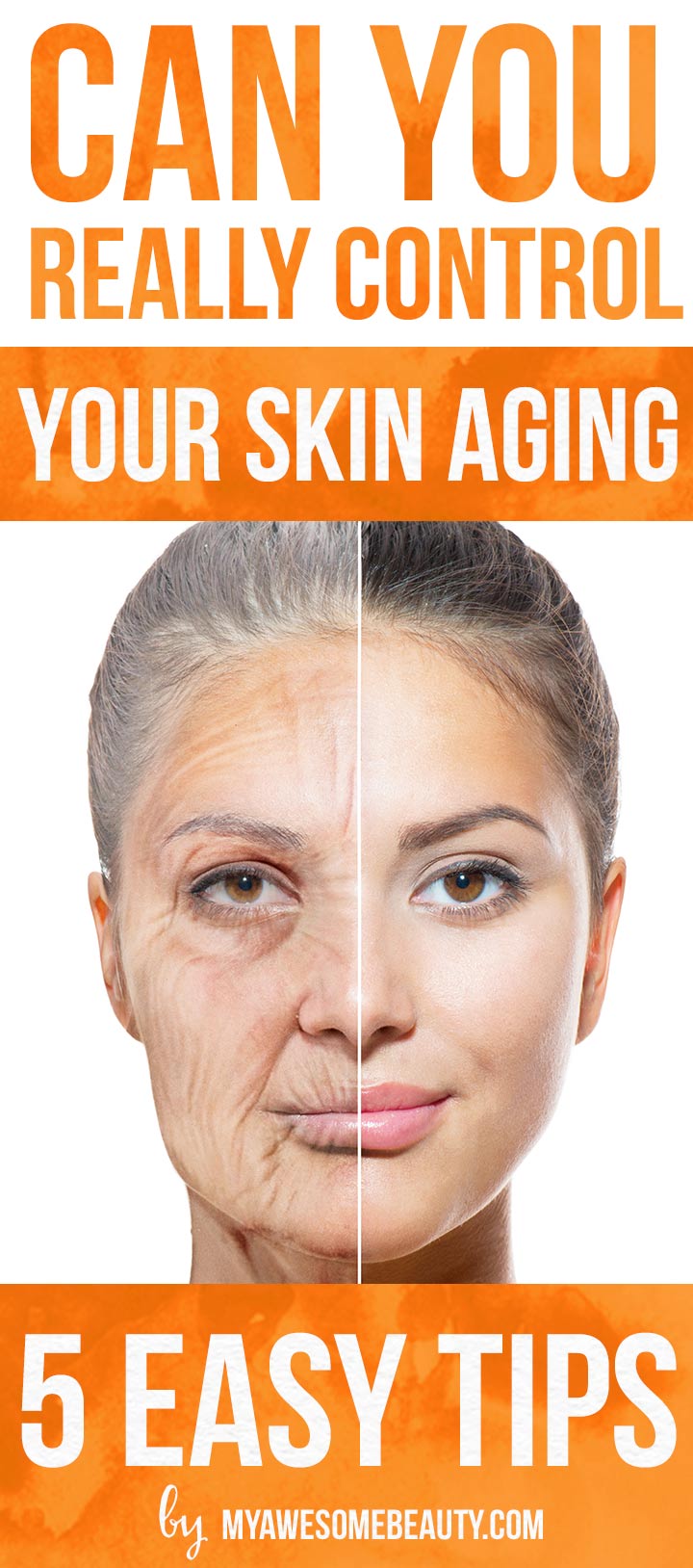
A debate on a par with nature versus nurture, determining whether your genetic make-up or your habits has the biggest effect on skin aging is one that has many of us pondering.
We all want to live many long and happy years; and ideally, we’d like them to be accompanied by smooth and fresh skin. So, do we have any control over that, or are we destined to walk the same skin-paths as our ancestors?
For those of us with smooth-skinned mothers and grandmothers, we might hope it’s the latter, but the reality is a little more complicated than that. You certainly can’t just kick back and hope the ‘good skin genes’ ship will sail you all the way to firm- and peachy-skinned old age.
Sadly, we cannot give you a magic formula to prevent aging, but we can tell you that you’ve got a larger role to play than you might think.
So, what’s up to Mother Nature?
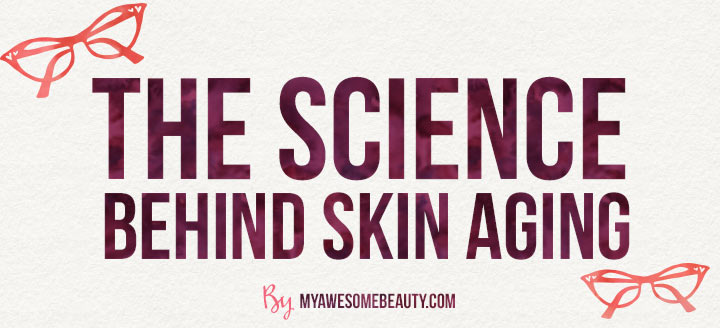
Good old Mother Nature definitely gets a say over how your skin ages – as she does on pretty much everything about our bodies! Just like medical conditions that can be inherited, you also have skin predispositions.
Your genes are responsible for your cells, which have a big impact on how your body ages and repairs itself. The quicker your cells turn over, the quicker skin damage is repaired and so your skin stays looking young.
Those plump-celled 20-somethings benefit from higher levels of collagen and elastin; as you might imagine from the names, these are definitely things that good skin needs and loves!
The older we get, the more elastin breaks down and collagen shrinks – those of us who have inherited skin with more collagen wait longer before this process begins.
It’s also about your telomeres, the new cool kid on the DNA block. These guys protect the end of our chromosomes and get shorter each time a chromosome duplicates.
What’s this got to do with your wrinkles? Well, this shortening happens in skin cells and such wear and tear has been associated with skin aging.
In 2016, scientists claimed that they had discovered that variations the MC1R gene, responsible for producing red hair and pale skin, actually made people look older. Others argued that this is just because red hair and pale skin means a higher chance of sun damage.
Either way, it’s not good news for redheads, and it’s certainly true that your genetics can affect your risk of things like skin sagging, varicose veins, discoloration and stretch marks.
But before you dash off to the family albums to see whether you’ve won the genetic lottery, remember that this isn’t the whole picture. Studies of identical twins have shown that at least 40% of aging factors are not genetic (some studies go so far as to say only 10% is genetics and DNA).
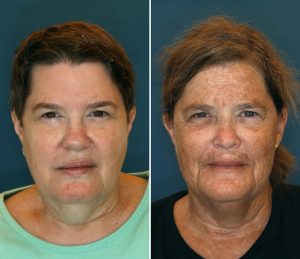
So, what’s up to us? The 5 tips to slow down skin aging
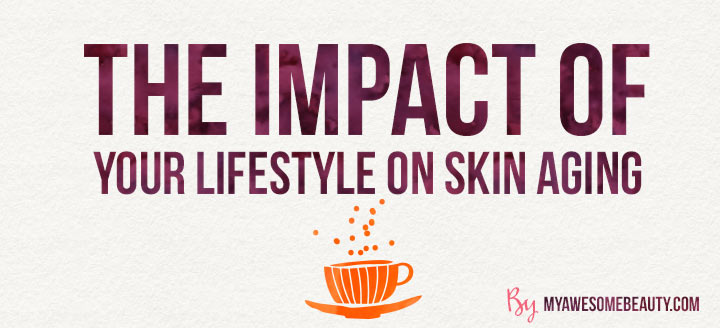
Let’s start with the good news, then: we have some control over how our skin ages! Depending on who you talk to, between 40% and 90% of what can age our skin is up to us.
The bad news?
We might have to make some effort. Don’t worry, not that much effort! But you do need to be making the right decisions and getting into some positive habits if you want to keep your skin looking younger for longer.
So let’s have a look at some of the lifestyle choices that can negatively influence the skin aging process. Try and remember them as the 5 S’s – the five bad fairies of the skincare world that you need to avoid or manage in order to maintain your youthful glow.
Effects of Smoking on skin
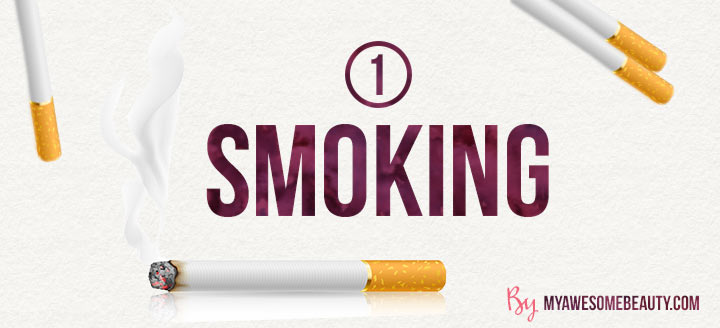
It really shouldn’t come as a surprise that smoking is bad for you. Aside from ruining your insides, it also can destroy your skin.
A study carried out over 4 years with 79 sets of twins, one of whom smoked and one of whom didn’t, showed that only five years of smoking made one twin look noticeably older than her twin (and her real age). Every ten years of smoking added two and half years to her perceived age.
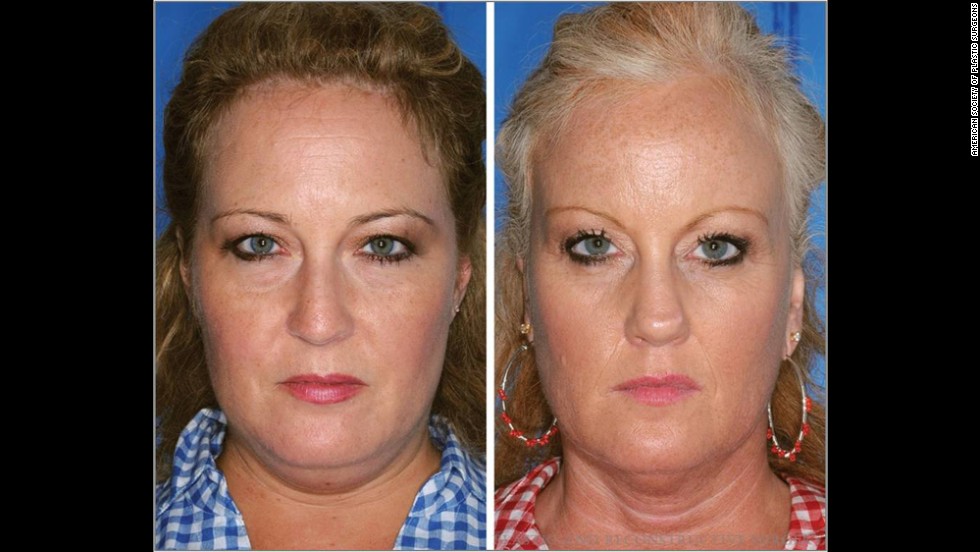
It’s no shocker, really, but the images are striking. Wrinkles around the lips and bags under the eyes were the most noticeable features of difference.
We know they looked sexy with cigarettes in old movies, but smoking is toxic, end of story. This naturally affects your skin along with all your other organs. The chemicals damage elastin and collagen (remember them?) which usually keep your skin supple.
Do you need more convincing? Well, you shouldn’t! Your skin starts improving as soon as you throw away those cigarettes because the oxygen can finally get to it again!
So, what are you waiting for?
Effect of Sun exposure on skin

As much as 80% of skin wrinkles are the result of sun exposure. Think about that one for a while!
We know, the sun is a wonderful and life-giving thing. We have all experienced that sheer joy when the first warm day of spring finally arrives after a long winter and you just want to rush outside and bask in it until the cows come home.
But while you are thirstily drinking in all the UV rays, your skin is shouting “no, please, no!” as those same UV rays do their damage to your skin cells and DNA.
The sun damages every layer of your skin. If you are lucky enough to avoid skin cancer, you will still end up with more wrinkled, more tired and older-looking skin.
Another twin study, linked to the one done on effects of smoking, showed that the twin who liked to tan looked considerably older than the one who used sunscreen. A tan might look good for a week, but the long-term effects just aren’t worth it.
Consider this photo of someone who had been a delivery truck driver for 28 years. The left side of his body had been consistently exposed to UV rays and although that was through glass, the photo damage was extensive and immediately visible.
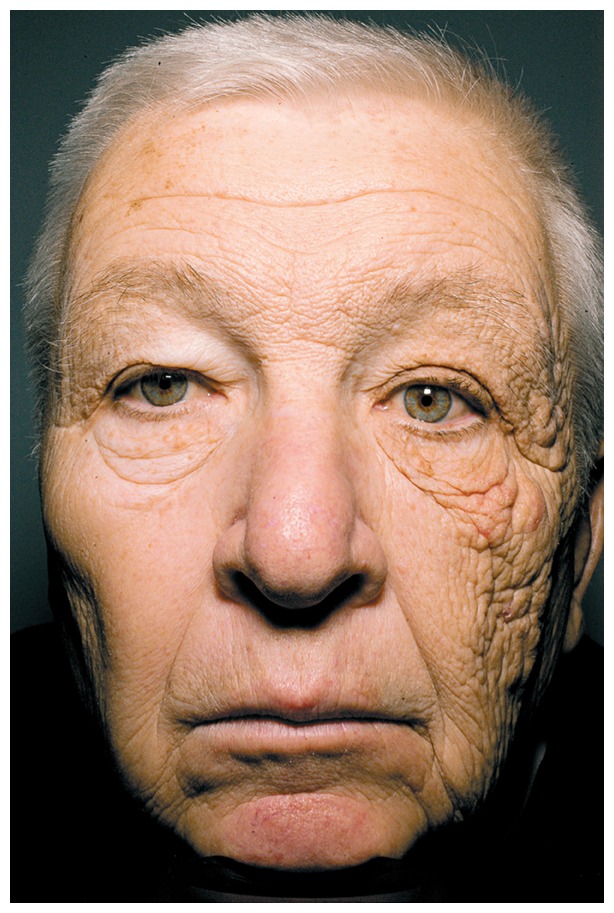
It proves, we’re afraid, that your mum was right – you have to wear sun tan lotion. At least SPF 30 and every time you go out in the sun, not just when you’re lying on a beach. You might think you’re just popping to the shops, but if the rays are strong enough, they’ll do damage even on a short spell in the sun.
Aside from smoking, suntan lotion is your best defense against aging. So, make it part of your routine and reap the benefits when you’re older.
Effects of Sleep deprivation on skin
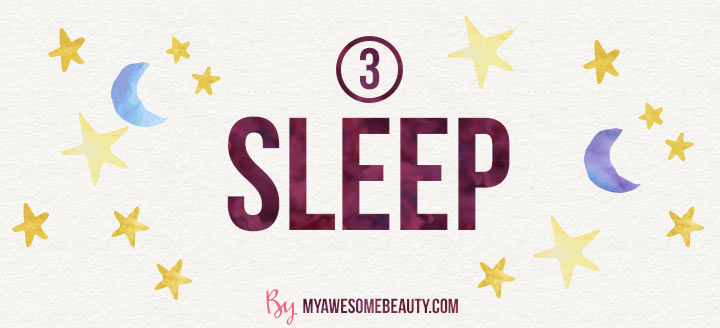
So many great things happen while you sleep. Your aching muscles relax, your cares slip away; and then there’s that dream where Ryan Gosling is a fireman and carries you off into the sunset.
But one of the most important things that happens is that your body gets a chance to repair and renew itself – and that includes you skin.
There is a reason, after all, that it’s called beauty sleep.
Your good night’s rest is time for toxins to be eliminated from the skin. Don’t get this time to cleanse, and the result is puffy eyes and dull, sagging skin.
A small study carried out in the UK nevertheless gave striking results. Thirty women who had five nights’ of six hours’ sleep instead of the recommended seven to eight hours, had their skin examined before and after the study; they had up to double the amount of wrinkles and lines. Not only that, they had up to three-quarters more brown spots as circles under the eyes.
Lack of sleep also released cortisol, the ‘stress hormone’, which in turn breaks down collagen, reducing that lovely bounce in your skin.
Depriving your skin of sleep is like depriving your body of food; those sweet REM cycles is what nourishes your skin and keeps it looking fresh and glowing.
Effects of Stress on skin

Stress and sleep are intrinsically linked. Stressed? Then you won’t get enough sleep, and your body won’t be able to do its skin-saving work at night.
Not enough sleep? Then you’ll feel stressed, and that brings with it a whole host of its own problems for your skin!
We already knew about stress breakouts, but it turns out feeling stressed can have long-term effects on your skin that could lead to you looking three to six years older than you are.
Remember what we said above about cortisol? Well that little stress hormone can wreak havoc on your skin. It breaks down your collagen like it’s at war, so the flexible protein is unable to keep your skin elastic and supple. This takes you down the path to earlier wrinkles and strangers assuming you’re already retired.
We know what you’re thinking: saying ‘don’t stress’ is easier said than done.
That’s true, but the good news is that a healthy lifestyle can go some way to undoing the negative effects of stress on cellular aging. Eating well, sleeping well and exercise will balance out the stress and result in less telomere shortening.
Exercise is not just good to manage stress; it also helps your skin in other ways, too. Sometimes people worry that the sweat worked up through physical activity will cause breakouts, which can happen; but the positive effects far outweigh the negative.
When you exercise, you send oxygen flowing around your body; this reaches your skin and helps it repair and strengthen.
There are also plenty of other ways to help control your stress levels: meditation, walks, regular breaks and time away from social media. Whatever works for you, try it. Your skin will thank you.
So, managing stress isn’t just taking care of your mental health; it’s taking care of your skin, so you can glow all through your later, stress-free years!
Effects of Screen time on skin
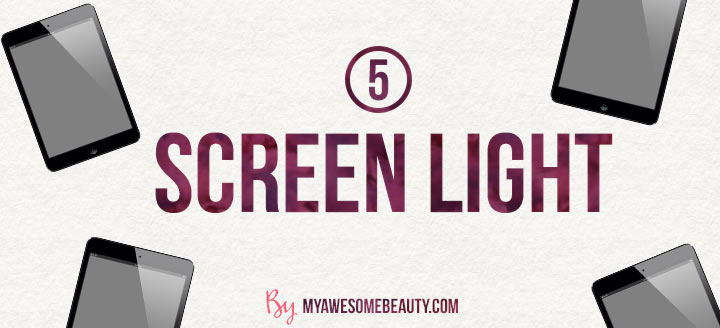
Speaking of glow, in today’s tech-heavy world we can’t avoid mentioning that late-night mobile phone glow. You might think an innocent Instagram scroll or checking the news before bed won’t do any harm, that glowing device could be causing ‘Screen Face’ – the premature aging caused by computer screens and smartphones.
Why? Well, that blue light (HEV – high energy visible light) is now believed by some to be almost as bad for your skin as sun exposure. It’s also present in almost every aspect of our daily lives.
Even if you agree with the many dermatologists who remain skeptical, there’s no doubt that staring at a screen before you go to bed (or once in bed, for many of us!) negatively affects your sleep. The light stimulates your system, making it hard for your brain to calm down enough to doze off.
Final thoughts
So, what’s the conclusion? The reality is that both your genes and your lifestyle will play a part in how your skin ages. Even if you have inherited a dewy, glowing complexion, it won’t stay like that if faced with years of smoking, late stressful nights and sunbathing.
Similarly, even if you were not dealt the best genetic hand, taking good care of your skin will go a long way towards ensuring you stay looking younger longer.
Your skin is your largest organ and it’s a good reflection of how you treat your body; a healthy body means healthy, young-looking skin. And the best news of all?
It’s never too late to start!
Leave a Reply